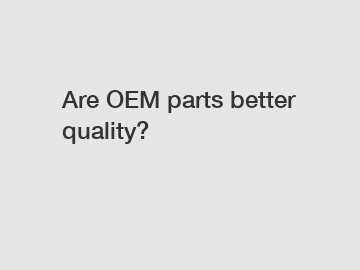Mar. 27, 2024
When it comes to replacing parts in your vehicle, the choice between OEM (Original Equipment Manufacturer) and aftermarket parts can be a difficult decision. Many people believe that OEM parts are of better quality and offer superior performance compared to their aftermarket counterparts. But is this really the case? Let's dive deeper into the world of OEM parts and see if they truly are the better choice.
OEM parts are made by the same companies that produced the original parts for your vehicle. These parts are designed to be an exact match to the original components, ensuring a perfect fit and optimal performance. Additionally, OEM parts are often held to higher manufacturing standards and quality control measures, which can give them a reputation for superior quality.
One of the main advantages of OEM parts is their reliability. Since they are designed and manufactured by the same companies that made the original parts, you can be confident that they will work seamlessly with your vehicle. This can provide peace of mind knowing that your car is being repaired with parts that are specifically tailored to your make and model.

In addition to reliability, OEM parts also come with warranties that can provide added protection in the event of any defects or malfunctions. These warranties are typically more comprehensive and longer-lasting than those offered for aftermarket parts, giving you greater assurance in the quality of the product.
Another benefit of OEM parts is their consistency. Since they are made by the original manufacturer, you can expect a consistent level of quality across all OEM products. This can be especially important for parts that are critical to the performance and safety of your vehicle, as any variations in quality could result in potential issues down the road.
However, despite these advantages, there are some drawbacks to consider when choosing OEM parts. One of the main concerns is the cost, as OEM parts are typically more expensive than aftermarket alternatives. This can add up quickly, especially if you need to replace multiple parts in your vehicle.
Additionally, OEM parts may not always offer the same level of customization or variety as aftermarket parts. Aftermarket manufacturers have the freedom to innovate and improve upon existing designs, which can result in parts that offer enhanced performance or features compared to their OEM counterparts.
Furthermore, availability can also be an issue with OEM parts. Since they are produced by the original manufacturer, OEM parts can sometimes be harder to find and may require longer lead times for delivery. This can be frustrating if you need a replacement part quickly and cannot afford to wait for it to be shipped.
In conclusion, while OEM parts are often associated with higher quality and reliability, they may not always be the best option for every situation. It is important to weigh the pros and cons of both OEM and aftermarket parts before making a decision on which to choose for your vehicle. Ultimately, the best choice will depend on your individual needs, budget, and preferences.
Whether you opt for OEM or aftermarket parts, it is important to trust the expertise and advice of your mechanic or automotive professional. They can provide valuable insights and recommendations to help you make the best decision for your vehicle. Remember, the most important thing is to ensure that your vehicle is repaired with parts that are safe, reliable, and compatible with its specific make and model.
For more information, please visit oem chery a1 auto spare parts, byd steering parts wholesale, oem jac brake parts.
Previous: None
Next: None
If you are interested in sending in a Guest Blogger Submission,welcome to write for us!
All Comments ( 0 )